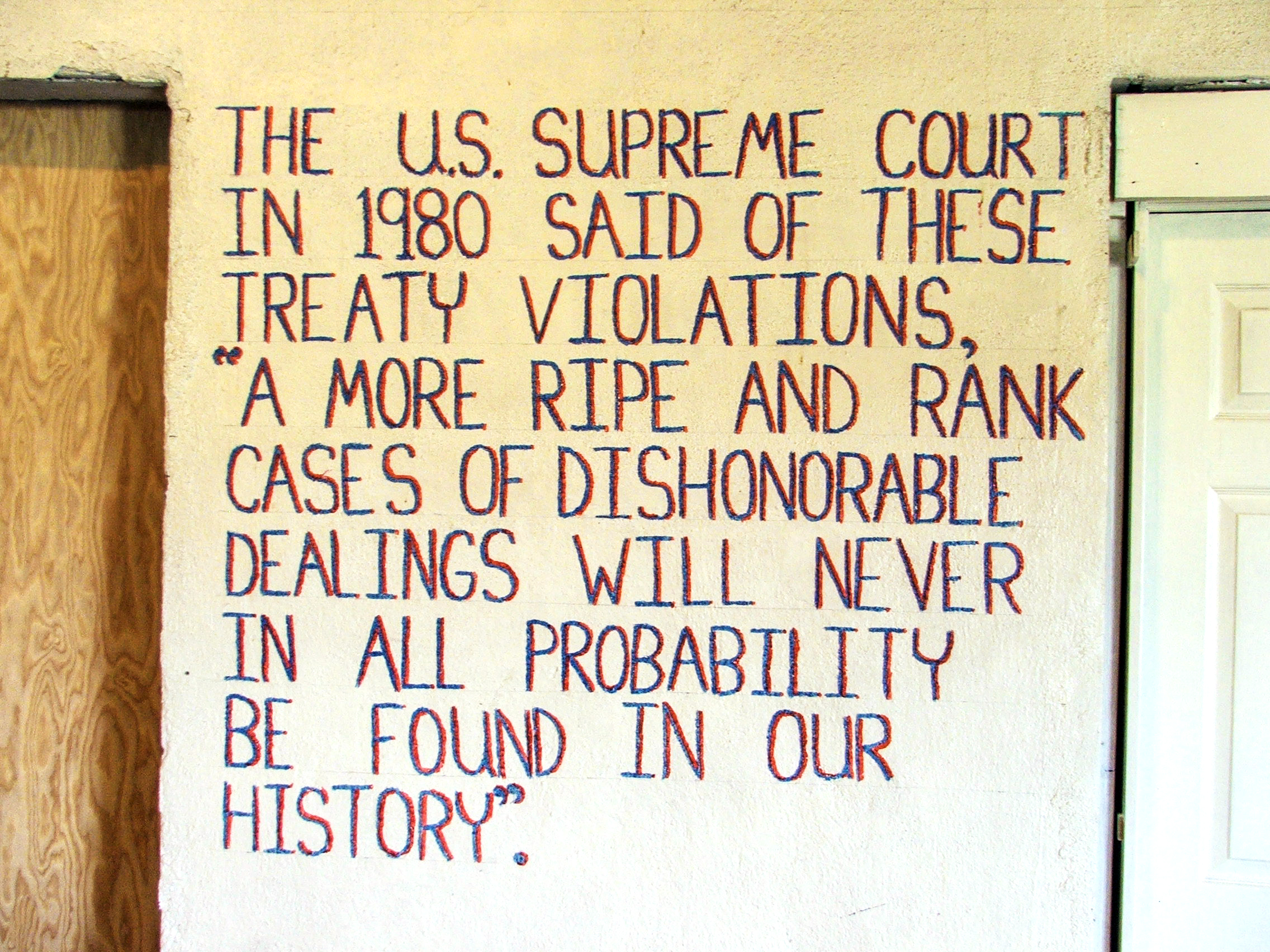OST opposes CNN FOIA request

A quote from the U.S. Court of Claims decision in the Sioux Nation’s Black Hills land claim case appears on a sign on the Pine Ridge Reservation in South Dakota. (Photo: Hamner_Fotos)
PINE RIDGE—In July 1980, $102 million was awarded to the treaty signatory tribes impacted by the 1877 taking of the Black Hills. Subsequently, in July 1987, the Claims Court awarded the signatories of the 1868 Fort Laramie Treaty an additional $40 million for the over 55 million acres taken outside the boundaries of the Great Sioux Reservation. The total came to $102, 245, 807.02, and it has been sitting in a Treasury Department account drawing interest for forty years. The award was not distributed because the Oglala Sioux Tribe (OST) filed an 11th Hour injunction to get out of the case because the lawyer for the other tribes, Arthur Lazarus, had failed to renew his contract with OST. The Court agreed, and since OST could not be paid for the Black Hills, no tribe could be paid for the Black Hills. Mario Gonzalez was the brainchild of this successful Black Hills saving strategy, but when he tried to apply it to the subsequent Docket-74 case, where it just as logically applied, since Lazarus was still the attorney of record, it was rejected. As a result, the combined monies sit drawing interest, and the amount is now over $2 billion and growing.
The exact sum of that account presently, is not considered public information by OST, even for enrolled tribal members, but on February 6, 2025, OST Treasurer Cora White Horse received a letter from the Interior Department informing the tribe that a Freedom of Information Act (FOIA) request had been made by Casey Tolan of CNN for “the most recent statement available listing the total amount of money held in trust by the Department of the Interior’s Bureau of Trust Funds Administration for the Sioux Tribes as part of the Black Hills Settlement.”
OST Tribal Attorney Mario Gonzalez crafted a 23 page OST response to the Interior Department letter, detailing why OST opposed the FOIA request by CNN, and the response was sent to the Interior Department on March 5, 2025.
The response states that “the Tribe objects” to the release of confidential information requested by CNN related to Docket 148-78 (Black Hills Claim) and Docket 74 (land outside the Great Sioux Reservation) “pursuant to FOIA Exemption 4, for the following reasons:
- The Interior Department has a fiduciary duty to keep all the information requested by CNN confidential regardless of whether the Tribe is a party to Docket 148-78 or Docket 74.
- Disclosure of the confidential information by CNN pursuant to its FOIA request will likely: be widely disseminated through its news media outlets thereby causing the Trump Administration to take notice and attempt to cut funding to the Tribe (and other Sioux tribes) for annual treaty and statutory benefits it receives unless it agrees to accept the Black Hills Claims money as payment for the Black Hills. In addition, it might cause some tribal members to put pressure on tribes to accept the award money drawing interest in Treasury and agree to have 80 percent of the ward distributed in per capita payments to tribal members pursuant to the Act of October 19, 1973 (878 Stat. 466).
Exemption 4 is the main plank of the Tribe’s objections to the CNN FOIA request. The Tribe argues that denying CNN’s FOIA request meets all three prongs of Exemption 4, and this is the conclusion of the letter sent to the Interior Department by OST:
“All legal requirements for invoking FOIA Exemption 4 are met, namely the Docket 74 and Docket 148-78 trust accounts statements information (1) qualifies as financial information; (2) was obtained from a person, namely the Sioux Tribes; and (3), is confidential within the meaning of the exemption as defined as defined by the Supreme Court in Argus Leader Media. The disclosure of this information, moreover, would also cause “foreseeable harm” to the exemption-protected interests of both the Tribes and the Government, thus meeting the additional requirement of the FOIA. Consequently, the Department should invoke Exemption 4 and deny CNN’s information request.”
As with most tribal requests to a Washington DC Department, it is not known how or when the Interior Department will respond.
(James Giago Davies is an enrolled member of OST. Contact him at skindioesel@msn.com)
The post OST opposes CNN FOIA request first appeared on Native Sun News Today.
Tags: Top News
